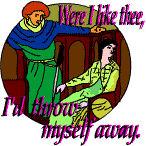Insults
Created | Updated Jan 12, 2012

'Wherein [art thou] good, but to taste sack and drink it? Wherein neat and cleanly, but to carve a capon and eat it? Wherein cunning, but in craft? Wherein crafty but in villainy? Wherein villainous, but in all things? Wherein worthy but in nothing?'
- William Shakespeare, Henry IV, part I
To insult, according to the dictionary, means to scornfully abuse, to affront, to serve an indignity. There are many different types of insults around that are mean, nasty and just plain rude. Whereas other types are more fun.
What it comes down to is a question of attitude, and this requires some rules:
The giver and receiver of the insult have to understand that it's all for fun.
Both parties need to be aware of any areas of vulnerability that are off limits.
The insults have to be clever.
Cleverness is the insulter's main line of defence. This is usually achieved through word play or by finding an insult that no one else would think of. The Cheap Shot is never a good insult, partly because it takes advantage of an easy target, uses words that are vulgar or common, but also because it lacks a degree of wit. Such an insult says more about the person making the insult, than the person it is insulting.
'Sell your face for five pence and 'tis dear.'
-William Shakespeare, King John
Different Types of Insults
Insulting Your Mother: This is a form of insult that is mainly heard in parts of America. It involves insulting the person by insulting the people they are fond of. It usually follows a basic sentence structure:
- Your mother's so fat, she's got her own postcode.
With substitutes for 'mother', 'fat', and the end of the sentence, you have a number of possibilities to play with, which can be clever if the insult is original.
Sarcasm: Often classed as humour's lowest form, sarcasm rarely comes across as clever. Saying, 'Oh. I'm sorry. Isn't Christmas five months away?' to a large person wearing red may be funny to you, but in most circles the only thing that would follow this kind of comment would be an embarrassed silence.
The Pun: Sometimes insults can take the form of a pun. To say to a cleaner that they have a heart of mould displays a certain amount of wit and, while the insult itself is weak, at least you score points for style.
Satire: Used to ridicule the stupidity of others, usually in positions of authority or celebrity. Sometimes this is a useful form of insult in that it humbles those who need humbling. However, unless this particular type of insult is shown in a public arena, it lacks that certain sting that can only be found in one-on-one jousting.
Insults as a Greeting: A technique perfected in Australia. While in many countries, the phrase 'How are ya, ya mangy b*****d?' would be deemed as somewhat offensive, in Australia this would mean that the two people in question are best friends.
The Retort: To really impress people with your insulting prowess, responding to someone else's insult with something better has to be the ultimate goal. Comebacks that floor an opponent are the Grand Slam of jibes. The better the riposte, the sweeter the victory.
The safest forum for the insult is to use it in a competitive friendly manner, and the best of these is in the form of some kind of contest. Insult matches can be common amongst established groups of friends, usually because of the comfort zones already mentioned.
'Were I like thee I'd throw away myself.'
- William Shakespeare, Timon of Athens
Rules
As with any contest, there have to be rules. Typical rules in a good insulting match include:
- No swearing.
- Avoiding racial insults.
- Mentioning minority groups is out of the question.
This can change though, due to the personal preference of the people involved.
'So, so, thou common dog, didst thou disgorge thy glutton bosom.'
- William Shakespeare, Henry IV, part 2
Keeping Score
For enjoyment (and for those who like to rate things), a point system may be used. Here is an example:
The killing stroke:
5 points: Completely blows an opponent away; almost impossible to achieve; an insult that deserves respect.Le touche:
4 points: The laughter and cheers all round variety; usually no chance for rebuttal.The standard:
3 points: Your average insult; merely makes an opponent red in the face.The feeble attempt:
2 points: Not much thought went into this one; usually a cheap shot; can be defeated with a few well chosen words.The pathetic:
1 point: You call this an insult? Get rid of this low life now.
Any insult is null and void if beaten by a better retort. Contestants should have a sense of fair play. Most will know whereabouts their insult or retort falls on the 1-5 scale, so there is probably no need for adjudication; but enthusiasts may want to cheer a fellow mudslinger on... Appreciating another's art always signifies good taste.
An insult match is no place for the sensitive. Attitude is important! If it seems that the barbs hurled at you are cutting a little too deep, get out of the game immediately. Similarly, be aware of the insults you throw, because you might receive back more than what you bargained for. Keep it fun.
'I scorn you, scurvy companion. What, you poor, base, rascally, cheating, lack-linen mate! Away, you moldy rogue, away!'
- William Shakespeare, Henry IV, part 2

